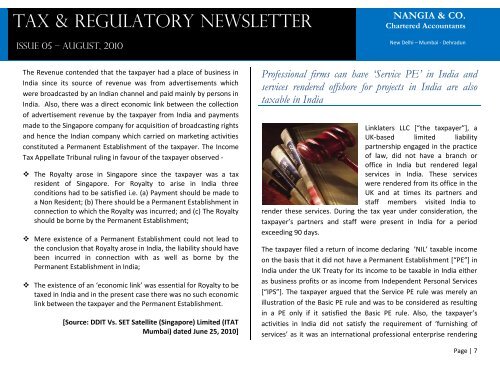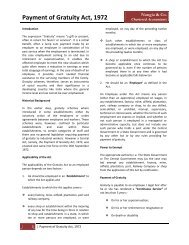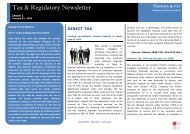DIRECT TAX - Nangia & Co
DIRECT TAX - Nangia & Co
DIRECT TAX - Nangia & Co
You also want an ePaper? Increase the reach of your titles
YUMPU automatically turns print PDFs into web optimized ePapers that Google loves.
Tax & Regulatory Newsletter<br />
Issue 05 – AUGUST, 2010<br />
NANGIA & CO.<br />
Chartered Accountants<br />
New Delhi – Mumbai - Dehradun<br />
The Revenue contended that the taxpayer had a place of business in<br />
India since its source of revenue was from advertisements which<br />
were broadcasted by an Indian channel and paid mainly by persons in<br />
India. Also, there was a direct economic link between the collection<br />
of advertisement revenue by the taxpayer from India and payments<br />
made to the Singapore company for acquisition of broadcasting rights<br />
and hence the Indian company which carried on marketing activities<br />
constituted a Permanent Establishment of the taxpayer. The Income<br />
Tax Appellate Tribunal ruling in favour of the taxpayer observed -<br />
The Royalty arose in Singapore since the taxpayer was a tax<br />
resident of Singapore. For Royalty to arise in India three<br />
conditions had to be satisfied i.e. (a) Payment should be made to<br />
a Non Resident; (b) There should be a Permanent Establishment in<br />
connection to which the Royalty was incurred; and (c) The Royalty<br />
should be borne by the Permanent Establishment;<br />
Mere existence of a Permanent Establishment could not lead to<br />
the conclusion that Royalty arose in India, the liability should have<br />
been incurred in connection with as well as borne by the<br />
Permanent Establishment in India;<br />
The existence of an ‘economic link’ was essential for Royalty to be<br />
taxed in India and in the present case there was no such economic<br />
link between the taxpayer and the Permanent Establishment.<br />
[Source: DDIT Vs. SET Satellite (Singapore) Limited (ITAT<br />
Mumbai) dated June 25, 2010]<br />
Professional firms can have ‘Service PE’ in India and<br />
services rendered offshore for projects in India are also<br />
taxable in India<br />
Linklaters LLC *“the taxpayer”+, a<br />
UK-based limited liability<br />
partnership engaged in the practice<br />
of law, did not have a branch or<br />
office in India but rendered legal<br />
services in India. These services<br />
were rendered from its office in the<br />
UK and at times its partners and<br />
staff members visited India to<br />
render these services. During the tax year under consideration, the<br />
taxpayer’s partners and staff were present in India for a period<br />
exceeding 90 days.<br />
The taxpayer filed a return of income declaring ’NIL’ taxable income<br />
on the basis that it did not have a Permanent Establishment *“PE”] in<br />
India under the UK Treaty for its income to be taxable in India either<br />
as business profits or as income from Independent Personal Services<br />
*“IPS”+. The taxpayer argued that the Service PE rule was merely an<br />
illustration of the Basic PE rule and was to be considered as resulting<br />
in a PE only if it satisfied the Basic PE rule. Also, the taxpayer’s<br />
activities in India did not satisfy the requirement of ‘furnishing of<br />
services’ as it was an international professional enterprise rendering<br />
Page | 7









